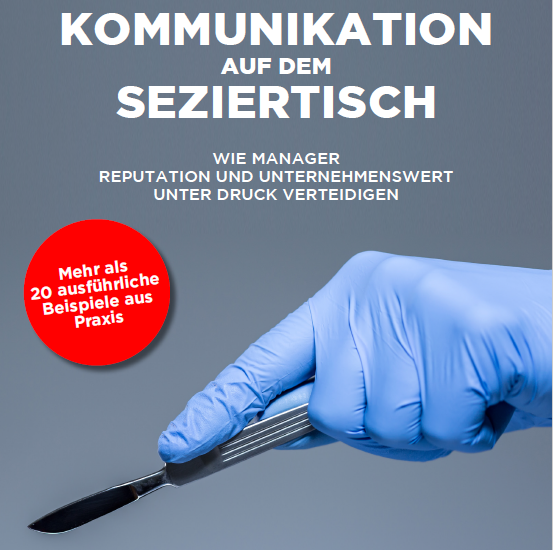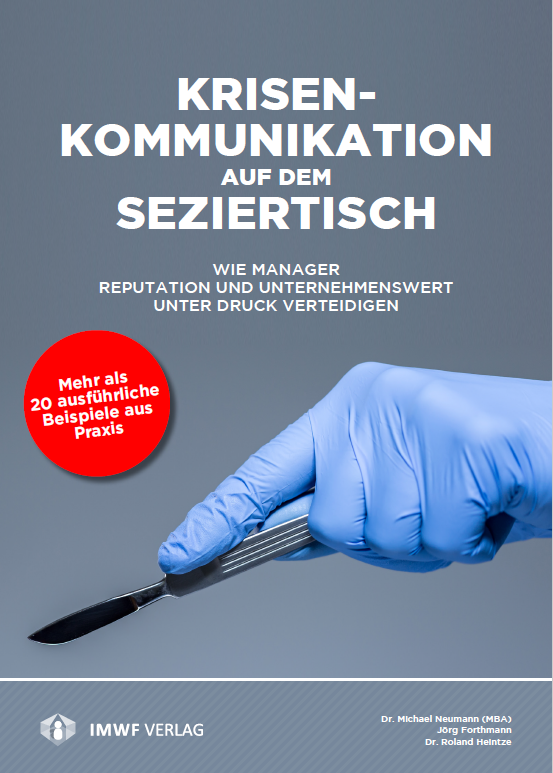- February 27, 2023
- Posted by: Die Redaktion
- Categories:

Wake-up call for communicators and their bosses
“Better to lose money than reputation.” This was a motto of Robert Bosch, the founder of the German technology company of the same name. More than 130 years after Bosch, we should specify based on experience: “Better to lose only money than money and reputation.” Because if you lose reputation and standing, sooner or later you also lose profit.Are the connections really that clear? If you lose reputation, you lose money? And whoever gains reputation, sooner or later it also fills the cash register? In most cases, yes, even if the causalities are confusing, would probably be the honest answer. In this book, we examine the cause, effect, and magnitude of reputational gains and losses through practical cases. And we answer the question of how to manage economically significant, i.e. money-making, reputations.Incidentally, this topic is not only of concern to managers and communications experts, but increasingly also to institutional investors, proxy advisors and insurance companies.
Investors are withdrawing from companies that earn their money with weapons, tobacco, addictive substances, child labor, exploitation or climate-damaging production because they fear losses in returns and reputation. And they, along with influential voting advisors, are pushing for so-called “clawback” clauses to be included in directors’ service contracts. This allows a company to withhold or reclaim variable compensation, among other things if top management has caused reputational damage. Fault in the legal sense, negligence or intent, is not required. In some arrangements, the company does not even have to prove financial damage.The May 2019 draft of the new Corporate Governance Code includes a recommendation for including “clawback” clauses in management board contracts. Most German corporations comply with the requirements of the Code.
The revised regulations will come into force upon publication by the Federal Ministry of Justice, which is not expected to happen until after the parliamentary summer recess in 2019. This would once again clarify for the approximately 700 listed companies in Germany that the Board of Management is responsible for managing valuable reputations – and is liable for damages.In order to be able to understand developments in individual cases as well, we have presented success stories, crises and scandals from practice in their chronology. On the basis of these cases, a clear system emerges for how communications managers and top executives can steer their companies in a crisis and avoid reputational damage. The message behind this book is clear: Reputation can be managed! At the latest after reading this book, there is no longer the excuse that reputation is too diffuse to manage. Reputation can be managed just like other risk classes in the company.
About the author and other contributors
Jörg Forthmann is a graduate industrial engineer and managing partner of Faktenkontor GmbH. After a sound journalistic education, he worked as a freelance journalist for the Hamburger Abendblatt and as a PR consultant in Hamburg, among others. He then worked in the press and public relations department of Nestlé Deutschland AG. His scope of work included corporate, brand and crisis communications. From 1999 to 2002, he was head of corporate communications at Mummert Consulting AG. In 2003, Jörg Forthmann founded Mummert Communications, now Faktenkontor, together with Dr. Roland Heintze. At Faktenkontor, Jörg Forthmann is responsible for analysis and in-house editing. He is also Faktenkontor’s expert for crisis PR. Jörg Forthmann sees the integration of a business perspective into press and public relations work as particularly important for modern, successful PR. Because PR can do more than just influence the image of a company in the media. By integrating economic principles, professional PR work can also directly promote sales, win new customers and thus increase sales of products and services in a targeted and comprehensible manner. Such a business approach, including a well-founded performance review, also strengthens PR departments within their own companies, because those who can prove that and how much they contribute to the operating result have a much stronger position in budget negotiations.
Dr. Roland Heintze is a political scientist and managing partner of Faktenkontor GmbH. He studied political science and history at the University of Hamburg until 1999, when he received a scholarship from the Konrad Adenauer Foundation to support young journalists. After a sound journalistic education, he worked as a freelance journalist, among others for Die Welt, Welt am Sonntag and Financial Times Deutschland. He worked as a freelance PR consultant for TOPAdvice Heintze & Partner before becoming press spokesman for Mummert Consulting AG from 2000 to 2003. In 2003, Dr. Roland Heintze founded today’s Faktenkontor together with Jörg Forthmann. At Faktenkontor, Dr. Roland Heintze is now responsible for strategy, sales and consulting. Faktenkontor consultants develop customized communication concepts for clients and implement them unerringly in campaigns. Dr. Roland Heintze sees the ability to understand not only the goals of one’s own company but also the view and working methods of editorial offices and journalists and to serve them with the appropriate content as a key competence for successful PR work. A press release only has a chance of being picked up by the media if it not only represents the interests of the sender, but also meets the needs of the readers and this is also quickly and clearly recognizable to the editor. The best means to achieve this are facts that are relevant and resilient from the editorial point of view. Dr. Roland Heintze is also an expert in reputation management, PR campaigns and social media concepts. In his blog Reputation Professionals, he regularly addresses how companies and managers can nurture and protect their reputations. In addition to his work for Faktenkontor and numerous voluntary commitments, Dr. Roland Heintze was a member of the Hamburg Parliament from 2004 to 2015, where he chaired the Budget Committee from November 2009 to March 2011 and served as deputy parliamentary group chairman from 2011 to 2015. Today he is CDU state chairman.
There are many more books which have been published by IMWF.


